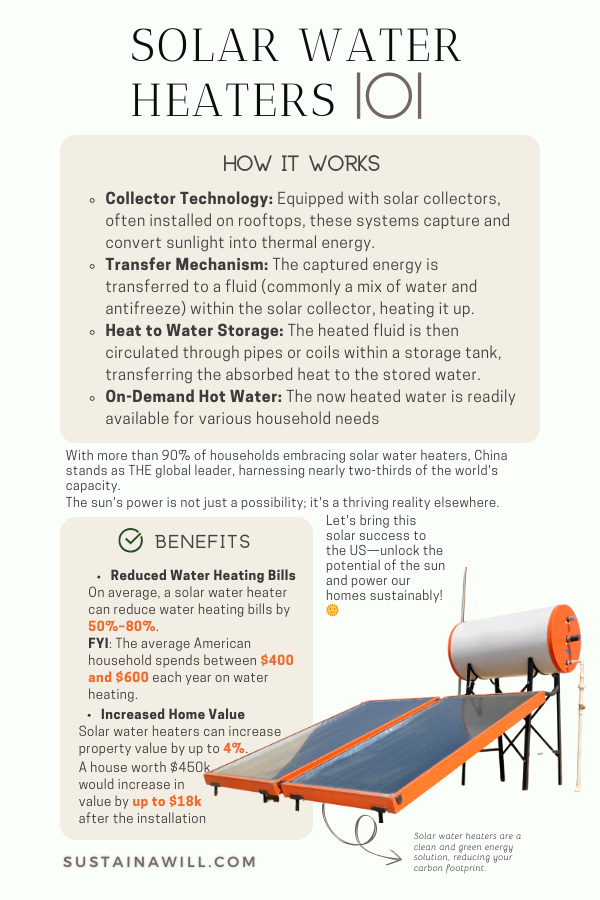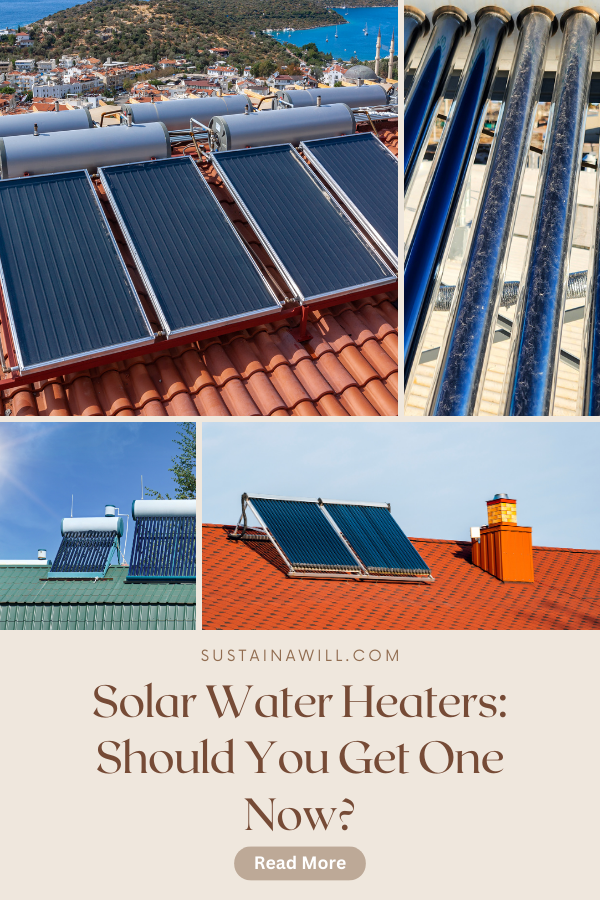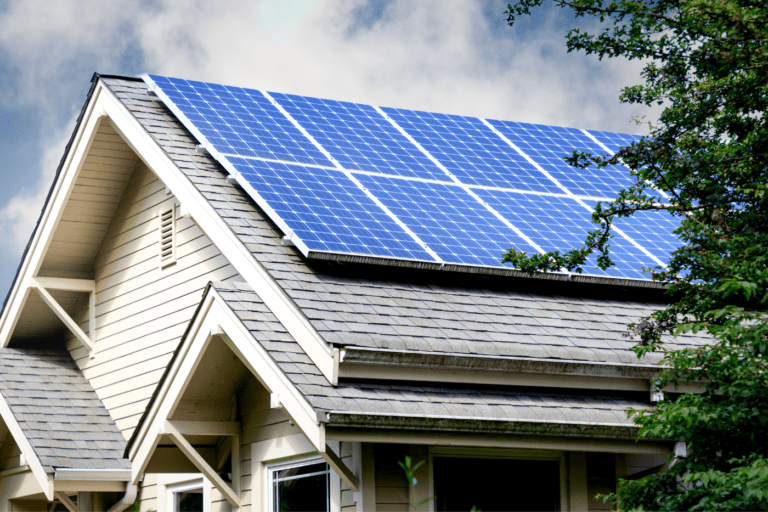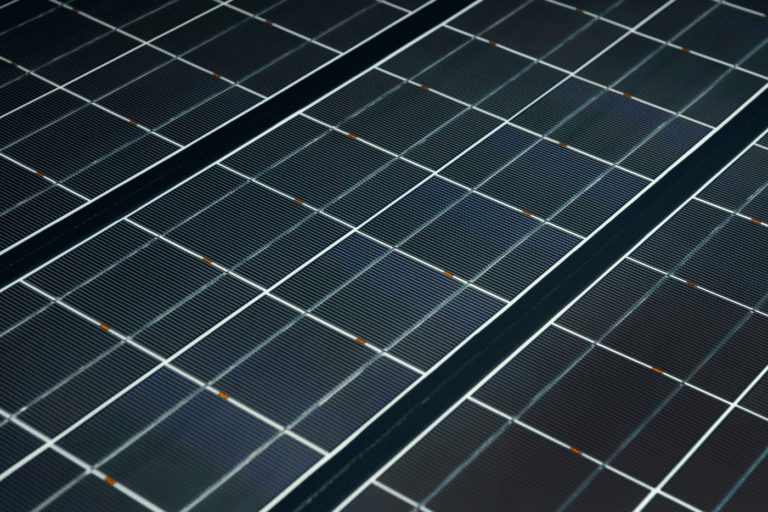Imagine this: the solar energy Earth receives in just one hour could power the world for an entire year! (source)
Yeah, you did read that right. Now you might ask yourself: How can I benefit from the sun’s immense potential?
Solar energy has many applications and one of these applications is solar water heating!
This guide is your key to understanding solar water heaters—your pathway to savings and sustainability. By the end, you’ll have a clear picture of whether a solar water heater is the right choice for you. 🌞
What is a Solar Water Heater? A Beginner’s Guide

A solar water heater is a smart and eco-friendly device crafted to harness the abundant power of solar energy, providing a sustainable solution for heating water in your home. Here’s a simple breakdown:
- Harvesting Sun’s Energy:
- Solar water heaters use sunlight to generate heat. They consist of collectors, typically installed on the roof, which absorb sunlight and convert it into usable thermal energy.
- Transfer to Water:
- This captured energy is then transferred to a fluid within the solar collector. This fluid, often a mix of water and antifreeze, gets heated by the sun’s rays.
- Hot Water Storage:
- The heated fluid is then circulated through pipes or coils within a storage tank. As it moves through these pipes, it transfers the absorbed heat to the water stored in the tank.
- Ready for Use:
- The hot water is now ready for your use, whether it’s for a refreshing shower, washing dishes, or any other hot water needs in your home.
Key Components:
- Solar Collectors: Devices that capture sunlight and convert it into thermal energy.
- Storage Tank: Where the heated water is stored until needed.
- Pipes/Coils: Transfer the absorbed heat from the fluid to the water.
Benefits:
- Cost Savings: By utilizing free sunlight, you reduce reliance on traditional energy sources, translating to lower energy bills.
- Environmentally Friendly: Solar water heaters are a clean and green energy solution, reducing your carbon footprint.
- Longevity: With proper maintenance, these systems have a long lifespan, providing reliable hot water for years.
In essence, a solar water heater transforms sunlight into a sustainable and cost-efficient hot water solution for your home, offering both economic and environmental advantages.
With more than 90% of households embracing solar water heaters, China stands as THE global leader, harnessing nearly two-thirds of the world’s capacity.
In 2009 alone, China added a staggering 11 million m2 of solar water heating systems (source).
The sun’s power is not just a possibility; it’s a thriving reality elsewhere. Let’s bring this solar success to the US—unlock the potential of the sun and power our homes sustainably! 🌞
How Do Solar Water Heaters Work?

Exploring the Solar Collector Process
Solar water heating starts with solar collectors, which are typically mounted on your roof or another sunny area. Here’s how they work:
- Absorption: The collectors are equipped with dark-colored metal plates or tubes, often coated with a heat-absorbing material. When sunlight hits these surfaces, they absorb the sun’s energy as heat.
- Heat Transfer: The absorbed heat is then transferred to a fluid (usually a mix of water and glycol to prevent freezing in cold weather) circulating through the collectors.
- Storage: This hot fluid is pumped into a well-insulated storage tank. Inside the tank, a coil or heat exchanger heats the water you’ll use in your home.
The Role of Storage Tanks and Circulation Systems
Storage tanks and circulation systems are key to a solar water heating system’s functionality:
- Storage Tank: This tank holds the heated water until you need it. It’s well-insulated to minimize heat loss. Make sure to choose a tank with sufficient capacity for your hot water needs.
- Circulation System: A pump circulates the fluid between the collectors and the storage tank. Some systems have a differential controller that only activates the pump when the collectors are hotter than the stored water, optimizing energy transfer.
Necessary Components for a Functioning System
Here are the key components you’ll need for a solar water heating system:
- Solar Collectors: These are the panels or tubes that collect sunlight and convert it into heat. They’re usually sold separately from the other components.
- Storage Tank: A well-insulated tank to store the heated water. You can find tanks sold separately or in kits.
- Circulation System: This includes the pump, control systems, and pipes that circulate the heat transfer fluid between the collectors and the tank. Some systems come in kits.
- Backup Heating Source: In case of extended cloudy days, having an electric or gas backup water heater ensures you always have hot water.
- Piping and Insulation: Pipes to connect the components and insulation to minimize heat loss.
- Mounting Hardware: If you’re installing collectors on your roof, you’ll need mounting hardware and brackets.
Whether you can find these components in a kit or separately depends on the manufacturer and your specific requirements. Kits can simplify the purchasing process, but custom solutions are also available if you have unique needs.
Is Solar Water Heating Right for You?

Assessing Your Home’s Suitability
Is your home a good candidate for a solar water heating system? Let’s find out:
- Home Location: If your house receives a good amount of sunlight throughout the year, such as in sunny regions or with minimal shading, solar water heating is an excellent choice.
- Roof Condition: Check if your roof is in good shape and can support the weight of solar panels. It’s important to ensure your roof can accommodate the collectors.
- Local Regulations: Research local zoning and building codes. Some areas have restrictions that may impact your ability to install solar collectors.
- Available Space: Evaluate if you have enough space for the solar collectors. Typically, you’ll need about 20-50 square feet of unshaded space for each collector.
- Energy Efficiency: Ensure your home is energy-efficient to maximize the benefits of solar heating. Insulation, windows, and energy-efficient appliances play a role here.
Understanding Your Hot Water Needs
To make an informed decision, consider your hot water consumption:
- Daily Usage: Determine your average daily hot water use. A family of four typically uses around 80-100 gallons per day.
- Peak Demand: Identify your peak demand times. If you have multiple showers, a dishwasher, and laundry running simultaneously, you’ll need a more robust solar water heating system.
- Water Temperature: Consider the desired water temperature. Solar water heaters can meet most needs, but if you require very high temperatures, you may need a backup system.
- Climate: Your local climate affects system performance. In colder climates, you might need larger collectors or a secondary heating source.
Verdict
If your home has a sunny location, ample space for collectors, and you’re an average hot water user, a solar water heating system is an ideal choice.
However, in colder climates or if you have high water demands, consider a system with larger collectors or a backup heating source for those cloudy days.
Making an informed choice based on your home’s suitability and hot water needs is the first step towards a more sustainable and cost-effective hot water solution.
Solar water heating could be the perfect fit for you!
Weighing Pros and Cons of Solar Water Heating

| Pros of Solar Water Heating | Cons of Solar Water Heating |
| Reduces Energy Bills | Higher Upfront Installation Costs: Depending on size and quality, commonly ranges around the 4-6k mark (incl. installation) for the average household |
| Reduces your Carbon Footprint: Solar water heaters use renewable energy from the sun, reducing the need for fossil fuels and lowering carbon emissions. | Weather-dependent performance: Correct sizing and backup heating options are essential to address this challenge and ensure optimal performance. |
| Low Maintenance | May Require a Backup System |
| Government Incentives Available | Space Needed for Collectors |
| Increases Home Value | |
| Increases Fuel Independence |
Let’s delve into two aspects that may particularly interest homeowners:
Energy Bill Reduction
Installing a solar water heater can lead to a substantial decrease in water heating bills, with potential savings ranging from 50% to 80%.
The average American household, spending between $400 and $600 annually on water heating alone, can benefit significantly from this eco-friendly solution.
Furthermore, the utilization of free solar energy provides a safeguard against potential fuel shortages and price fluctuations.
- On average, a solar water heater can reduce water heating bills by 50%–80%.
- The average American household spends between $400 and $600 each year on water heating.
- Utilizing free solar energy protects against future fuel shortages and price hikes.
(Source: Department of Energy)
You’re in the process of constructing a new home or refinancing? Even better!
Incorporating the cost of a solar water heater into a brand-new 30-year mortgage typically translates to a monthly addition of $13 to $20.
Taking into account the federal income tax deduction for mortgage interest related to the solar system further reduces this by approximately $3 to $5 per month.
Therefore, if your monthly fuel savings exceed $15, your solar investment becomes immediately profitable, with monthly savings surpassing costs. (Source: Department of Energy)
RECAP
- Including the cost of a solar water heater in a new 30-year mortgage amounts to $13 to $20 per month.
- Federal income tax deduction for mortgage interest reduces this by about $3–$5 per month.
- If monthly fuel savings exceed $15, the solar investment is immediately profitable.
Increased Home Value
The installation of a solar water heater doesn’t just contribute to energy savings; it can enhance your property’s value by up to 4%.
This value addition outperforms the returns associated with traditional or tankless water heaters.
Notably, homes with tankless water heaters, for instance, have been observed to sell for 4% more than anticipated and 43 days faster, according to available data.
RECAP
- Solar water heaters can increase property value by up to 4%.
- Homes with tankless water heaters sell for 4% more than expected and 43 days faster.
- A house worth $450k would increase in value by up to $18k after the installation
What Types of Solar Water Heaters Are Available?

Comparing Active vs. Passive Systems
When it comes to solar water heating systems, there are two main types: active and passive. Let’s break down the differences:
Active Solar Water Heating Systems
- Direct Systems: In direct systems, water circulates through the solar collectors and into your home. These are suitable for areas with mild freezing conditions, but the water in the collectors can freeze in colder climates.
- Indirect Systems: In indirect systems, a non-freezing heat transfer fluid circulates through the collectors. It heats water indirectly through a heat exchanger. These are a good choice for areas with harsh winters.
Passive Solar Water Heating Systems
- Integral Collector-Storage (ICS) Systems: These systems are also known as “batch” or “breadbox” heaters. They feature a storage tank integrated with the solar collector. They work well in areas with mild freezing conditions.
- Thermosiphon Systems: This type of passive system relies on warm water rising and cold water sinking. The collector is installed below the storage tank. It’s a reliable option for areas with mild winters.
Active vs. Passive Systems
- Active Systems: Ideal for consistent hot water supply and high demands.
- Passive Systems: Cost-effective and low-maintenance, suitable for milder climates and lower hot water needs.
Your choice depends on your climate and hot water requirements.
Selecting the Right Collector Type
Choosing the right collector type is crucial for your solar water heating system. Here are some tricks to help you decide:
- Flat-Plate Collectors: These are the most common and cost-effective. They are best suited for warmer climates and work well for domestic hot water.
- Evacuated Tube Collectors: These collectors are more efficient in colder climates and can operate in lower light conditions. They are ideal for space heating and water heating.
- Batch Collectors: Great for ICS systems, they are simple, cost-effective, and work well in moderate climates.
- Selective Surface Collectors: These collectors have coatings that enhance their efficiency. They are ideal if you have limited space for installation.
- Copper vs. Aluminum Absorbers: Copper is more efficient but also more expensive. Aluminum is cost-effective but slightly less efficient. The choice depends on your budget and location.
When selecting a collector type, consider your climate, available space, and budget. It’s often a good idea to consult with a professional to determine the best fit for your specific circumstances.
DIY Installation vs. Professional Installation: Which Is Right for You?

DIY Installation Checklist
- I have experience with plumbing and basic construction.
- I’m comfortable working on rooftops and using the necessary tools.
- I enjoy DIY projects and have the time to dedicate to the installation.
- I want to save money on installation costs.
- I’ve thoroughly researched and understand the installation process.
- I have access to all required tools and equipment.
- I can handle potential maintenance and troubleshooting on my own.
Professional Installation Checklist
- I lack experience in plumbing and construction.
- I’m not comfortable working on rooftops or using tools.
- I prefer a hassle-free installation without doing it myself.
- I’m concerned about the warranty and want to ensure it remains valid.
- I want to guarantee the system is installed correctly for optimal performance.
- I don’t have all the necessary tools and equipment.
- I prefer professional maintenance and support for any issues.
Verdict
If you’re a DIY enthusiast with the right experience, tools, and time, and you’re confident in your ability to handle installation and potential maintenance, DIY installation may be the cost-effective and rewarding choice.
On the other hand, if you lack the necessary skills or prefer the peace of mind that comes with professional installation and ongoing support, choosing a qualified installer is your best bet. This ensures optimal performance, warranty adherence, and hassle-free operation.
The decision ultimately depends on your comfort level, experience, and the importance you place on the convenience and warranty assurance of a professional installation.
How Much Does A Solar Water Heater Cost?

Investing in a solar water heater may seem costly initially, but its long-term benefits make it a wise choice. The cost varies depending on the system’s size and quality. Here’s a breakdown:
- A 200 L single-coil system starts at $3,000.
- For larger needs, a 1000 L Dual Coil system is priced around $11,400, suitable for substantial buildings in exceptionally sunny areas.
Consider professional installation costs if DIY isn’t your preference, ranging from an additional $1,000 to $3,000 based on the system’s size.
Average Cost for a 4-Person Household (Including Installation):
- Falls within the range of $4,000 to $6,000 per system.
While the upfront investment may vary, the long-term savings and environmental benefits make solar water heaters a cost-effective and sustainable solution for households.
Top 3 Amazon DIY Solar Water Heater Kits
1. Sunbank Solar SB-40G Solar Water Heater
Best for: An affordable and eco-friendly solution for water heating, ideal for 1-3 people.

| What We Love | Room for Improvement |
| – High energy efficiency (92%-96% solar radiation absorption). | – |
| – Pressurized system for consistent water pressure. | |
| – Virtually maintenance-free (no glycol, pumps, or moving parts). | |
| – Includes a 240V backup heating element. | |
| – 10-year warranty on vacuum tube collectors. |
Meet the Sunbank Solar SB-40G, your affordable ticket to sustainable water heating. This eco-friendly solution is perfect for small households, comfortably catering to 1-3 people.
It boasts an impressive 92%-96% solar radiation absorption rate. This means efficient conversion of sunlight into heat. The pressurized system ensures seamless water flow, just like your standard water heater.
One of its standout features is that it doesn’t require glycol or pumps and has no moving parts, making it virtually maintenance-free. In case of less sunlight, the SB-40G comes with a 240V backup heating element to ensure you always have hot water available.
Price at time of publication
$2,999
Product Info
- Dimensions: 84″ W x 24″ H
- Weight: 180 pounds
- Voltage: 240 Volts
- Finish: Stainless Steel
- Style: Indoor Installation
- Manufacturer: Sunbank Solar
- Pattern: Passive
- Installation Method: Pitched roof, flat roof, or ground-mounted
- Usage: Water Heating, solar water heating, domestic water heating
- Included Components: Tank, collector, and pitched roof flush mount bracket included
- Warranty Description: 10-year warranty on vacuum tube collectors
2. Heliatos Solar 4 Panel Freeze Protected Solar Water Heating Kit
Best for: DIY enthusiasts looking for a freeze-protected solar water heating solution with room for expansion.

| What We Love | Room for Improvement |
| – DIY kit with 4 panels and essential components for solar water heating. | – Specific dimensions and PV panel wattage details not provided. |
| – Freeze-protected system with Stainless Steel Heat Exchanger and non-toxic antifreeze. | |
| – Seamless connection to existing water heaters without interference. | |
| – Reliable hot water supply even during cloudy days. | |
| – Easily expand the system with additional panels. |
The Heliatos Solar 4 Panel Freeze Protected Solar Water Heating Kit is a DIY dream come true. With four panels and all the vital components, it simplifies solar water heating.
A standout feature is its freeze protection, working down to -30°F. A Stainless Steel Heat Exchanger and non-toxic antifreeze make it possible.
This kit seamlessly connects to your existing water heater without fuss, whether it’s gas or electric, so you’ll have hot water even on cloudy days. You can also expand the system with more panels.
You’ll receive detailed installation instructions to help you set up the system.
However, you’ll need to provide:
- 1/2″ pipe from the panels to the water heater (options include copper, CPVC, or PEX)
- fasteners to attach the panels to the roof
- and insulation for the pipes
Price at time of publication
$1,718
Product Info
- Dimensions: 28 x 12 x 28 inches
- Weight: 91 pounds
- Style: Indoor Installation
- Material: Stainless Steel, Copper
3. Duda Solar 400 Liter Water Heater Active Split System
Best for: Those seeking a comprehensive solar water heating system with a large capacity and multiple components.

| What We Love | Room for Improvement |
| – Extensive set comprising a dual coil tank, 40 vacuum tubes, and more. | |
| – Large 400-liter stainless steel tank. | – Specific dimensions not provided. |
| – Comes with working station, controller, pump, and more. | |
| – Automatic air vent, submersible water pump, and thermostatic mixing valve included. | |
| – Certified by OG-100 SRCC Collector for quality assurance. | |
| – Substantial 3 gallons of food-grade inhibited propylene glycol. |
The Duda Solar 400 Liter Water Heater Active Split System offers an extensive solution for solar water heating. This system is suitable for households with about 5 members.
This system features a large 400-liter stainless steel tank and includes 40 vacuum tubes with a 45-degree frame for efficient heating. The set comprises a working station with a controller and pump, an automatic air vent, and a submersible water pump for system charging. It also comes with a thermostatic mixing valve to ensure the perfect water temperature.
With OG-100 SRCC Collector certification, this system ensures quality and reliability. Additionally, you’ll receive a substantial 3 gallons of food-grade inhibited propylene glycol to keep your system running efficiently.
Price at time of publication
$5,236
These solar water heater kits are excellent options for various needs and budgets, and they offer a range of features to suit different preferences.
Whether you’re in a cold climate, looking for cost-effective solutions, or need a compact collector, there’s a kit to meet your specific requirements.
How Much Can a Solar Water Heater System Save You?

When considering the potential savings of a solar water heater system, the Department of Energy estimates a remarkable drop in water heating bills by 50%–80%.
With the average American household spending between $400 and $600 annually on water heating, this translates to potential savings ranging from $200 to $480 per year.
Let’s delve into the financial implications using a hypothetical scenario:
- Investment Cost:
- Assuming a solar water heating system costs around $4.5k, including installation.
- Payback Period:
- With a median annual saving of $340, the payback period for your investment would be approximately 14.7 years.
- Lifetime Savings:
- According to Energy Star, certified solar water heating systems have an average life expectancy of 20 years, outlasting standard gas or electric storage water heaters. This longevity provides 5.3 years of free water heating based solely on the annual savings mentioned above.
- Property Value Increase:
- Installing a solar water heating system can boost your property’s value by 4%, a return not offered by traditional or tankless water heaters. For a property valued at around $400k, this implies an immediate increase in value by $16k.
- Advantage for New Mortgages:
- For those building new homes or refinancing, the financial benefits are even more compelling. Including the solar water heater cost in a new 30-year mortgage usually amounts to $13–$20 per month. With a federal income tax deduction of $3–$5 per month, the solar investment becomes immediately profitable if monthly fuel savings exceed $15.
Harnessing the financial benefits of solar water heaters proves not only economically savvy but also enhances property value, presenting a lucrative and sustainable investment for homeowners.
Sources
Are There Financial Incentives for Solar Water Heating?

Investigating Government Incentives and Tax Credits
- Federal Tax Credits: The U.S. federal government offers a generous 30% tax credit on the cost of purchasing and installing a solar water heating system. This reduces your federal income tax, providing a significant financial incentive.
- State and Local Incentives: Many states and local governments offer additional incentives, rebates, and grants to promote solar water heating. Research what’s available in your area to maximize your savings.
- Renewable Energy Credits (RECs): In some regions, you may be able to sell Renewable Energy Credits for excess energy generated by your solar water heater. This can further offset your costs.
By tapping into these financial benefits, you can not only enjoy lower energy bills but also potentially recoup your initial investment faster. It’s a win-win for your wallet and the environment!
What Maintenance Does a Solar Water Heater Require?

Regular maintenance is essential to ensure your solar water heater operates efficiently and has a long lifespan. Here’s what you should keep in mind:
1. Routine Check-Ups and Cleaning
Inspect Solar Collectors
Frequency: Every 3 to 6 months. Solar collectors should be checked for dirt, dust, or any obstructions. Clean them as needed to ensure maximum sunlight absorption.
Inspect Pipes and Connections
Frequency: Every 6 to 12 months. Examine all pipes, connections, and joints for any signs of leakage. Tighten or repair as necessary to prevent water or heat loss.
Check for Corrosion
Frequency: Annually. Inspect the system for any signs of corrosion on metal parts. If you notice rust, address it promptly to avoid further damage.
Monitor Fluid Levels
Frequency: Annually. For active systems, verify that the heat-transfer fluid (usually a mixture of water and antifreeze) is at the appropriate level. Adjust if needed, following the manufacturer’s guidelines.
2. Troubleshooting Common Issues
Inadequate Hot Water
Frequency: As needed. If you’re not getting enough hot water, check the solar collectors for shading, dirt, or misalignment. Also, ensure that the backup heating system is functioning correctly.
Freezing or Overheating
Frequency: As needed. In areas with extreme temperatures, freezing or overheating can be an issue. Make sure the system has adequate insulation and that the antifreeze concentration is suitable for the climate.
Leaking or Dripping
Frequency: As needed. Address leaks or drips immediately. They can lead to significant water and energy wastage. Inspect pipes, valves, and connections for damage.
Pump and Circulation Problems
Frequency: As needed. If your water isn’t circulating correctly, it could be due to pump issues. Check the pump and associated components to ensure they’re functioning correctly.
Faulty Temperature Sensors
Frequency: Annually. Sometimes, temperature sensors may malfunction, causing the system to operate inefficiently. Test and replace sensors as needed.
Regularly checking your solar water heating system and promptly addressing any issues will help maintain its efficiency and extend its lifespan.
With proper maintenance, you can continue to enjoy the benefits of renewable hot water for years to come.
RECAP: What Should You Consider Before Making the Switch?
- Making an Informed Decision
- Assess Your Hot Water Needs: Determine your household’s hot water consumption, including daily usage and peak demand times.
- Local Climate: Consider your local climate conditions, such as sunlight availability and average temperatures.
- Budget and Financing: Evaluate the upfront cost of installation and potential savings in the long run. Explore financing options and incentives.
- Space and Installation: Check the available roof or ground space for collectors and the feasibility of installation.
- System Type: Choose between active and passive systems based on your needs and space availability.
- Finding Qualified Solar Water Heater Installers
- Research Local Installers: Look for reputable and certified solar water heater installers in your area.
- References and Reviews: Seek recommendations from friends or family who have installed solar water heaters. Read reviews and testimonials.
- Qualifications and Certification: Ensure that the installer holds the necessary licenses and certifications.
- Get Multiple Quotes: Obtain quotes from multiple installers to compare costs and services.
- Ask Questions: During consultations, ask about the installer’s experience, warranties, and the installation process.
By considering these factors and finding qualified installers, you can make an informed decision when switching to solar water heating.
FAQs for Solar Water Heaters
- How much can I save on my energy bills with a solar water heater?
The savings can vary depending on your location, system size, and usage. On average, homeowners can save between 50% and 80% on their water heating costs. - Do solar water heaters work in cold climates?
Yes, they do. While they are more efficient in sunnier regions, advanced designs and antifreeze solutions make them suitable for cold climates as well. - What maintenance is required for a solar water heater?
Regular checks, cleaning of collectors, and inspections are needed. Most components should be maintained annually, while others may require attention every 3-5 years. - What is the lifespan of a solar water heater?
Typically, a solar water heater can last 15-20 years or more with proper maintenance. - How do I know what size system I need for my home?
It depends on your location, hot water usage, and family size. A professional installer can help you determine the right system size.
Conclusion
Solar water heaters open the door to incredible savings on your energy bills while also contributing to a healthier planet.
By assessing your unique needs, understanding the technology, and making an informed decision, you’re taking a step closer to harnessing the power of the sun for your benefit.
With solar water heating, you’re not only adopting an eco-friendly solution, but you’re also putting more money back in your pocket. So go ahead, make the switch, and embrace a brighter, cleaner, and more sustainable future.







